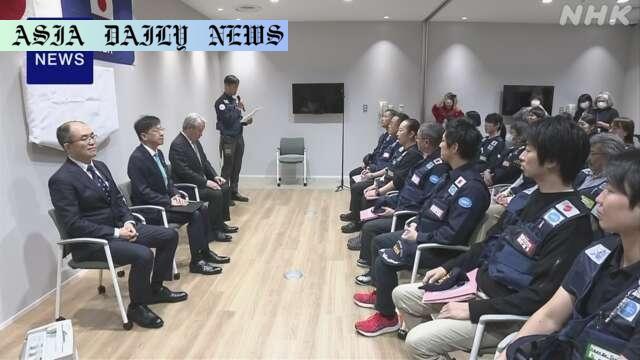Medical Team: A Japanese disaster relief effort provides critical medical support to earthquake survivors in Myanmar.
- A 32-member Japanese medical team heads to Myanmar for disaster relief.
- The team will provide medical aid and prevent illnesses post-quake.
- Efforts highlight Japan’s commitment to global disaster support.

Japan’s Commitment to Global Humanitarian Efforts
In the wake of Myanmar’s devastating earthquake, Japan has demonstrated its unwavering commitment to humanitarian aid by dispatching a 32-member disaster relief medical team. Departing from Tokyo’s Haneda Airport early Wednesday, the team embodies a message of hope and support for those grappling with the aftermath of the disaster. Their mission is to deliver life-saving medical assistance and attend to immediate and long-term health needs, particularly as risks of infectious diseases and climate-related illnesses rise. This initiative follows a strategic effort by Japan to assess the on-ground requirements and respond accordingly with precision and expertise.
This endeavor is spearheaded by several experienced professionals, including team leader Yazama Hideyuki of Japan’s Foreign Ministry, who affirmed the team’s dedication to providing survivor-centric care. As Dr. Oba Jiro commented, this mission is not only about treating immediate injuries but also about addressing secondary health hazards linked to hot weather and debris. Japan’s extensive experience with disaster management ensures that its medical teams are well-prepared for such situations, a fact underlined by the expertise of Dr. Oba, who had previously contributed to relief efforts in Japan.
Preparing for Challenges Unique to Post-Disaster Scenarios
One key concern highlighted by the medical team is the high risk of rising infectious diseases following the quake. In areas where infrastructural damages compromise sanitation and access to clean water, maintaining public health becomes an urgent priority. Having worked in similar conditions in Japan, the team brings a wealth of knowledge in addressing post-disaster challenges. Importantly, the hot climate and contamination due to dust and debris pose unique medical issues. The team’s two-week deployment in Myanmar will focus on preventive measures, disease management, and providing emotional support to survivors, ensuring that relief efforts address both physical and psychological injuries sustained during the disaster.
Japan’s decision to mobilize a sizable and specialized team demonstrates the importance of global partnerships in tackling natural disasters. It is a profound example of how nations with resources and expertise can step up to lend support in times of dire need. This collaborative spirit not only saves countless lives but also fosters meaningful international relations.
Hope for Survivors: A Path Forward
The deployment of the Japanese medical team to Myanmar signals a beacon of hope for the earthquake survivors. While immediate medical attention is the team’s primary goal, their presence in the affected region also builds morale and offers emotional assurance to those enduring both loss and displacement. With their combined expertise in managing wide-ranging post-disaster scenarios, the medical team is poised to make a significant impact on the lives of the survivors. The partnership between Japan and Myanmar in this challenging time serves as a testament to the importance of unity and cooperation during global emergencies.
Natural disasters cause immense devastation, but efforts like these showcase the resilience and courage of humanity. This mission not only brings critical aid to those in need but also strengthens the enduring ties of friendship and solidarity between nations. Through their work, the Japanese disaster relief team exemplifies the values of compassion, cooperation, and hope in the face of adversity.



Commentary
The Role of International Medical Teams in Disaster Relief
The deployment of medical teams to disaster-hit regions is a beacon of humanity and cooperation. The Japanese medical team heading to Myanmar exemplifies the selfless efforts nations can make to support those in dire distress. In the aftermath of such a massive quake, survivors are vulnerable to a host of issues, including medical emergencies, psychological trauma, and disruptions to their daily lives. International aid, particularly in the form of healthcare services, is paramount in mitigating the long-term consequences of such disasters.
From a global perspective, providing disaster relief transcends the immediate need for aid—it highlights the impact of strategic planning and preparedness. Japan’s rich experience in post-disaster care, owing to its own history with earthquakes, ensures that the team’s intervention will likely be both impactful and efficient. The transitions they can make, from treating injuries to monitoring and controlling diseases caused by environmental factors, reinforce the multifaceted approach needed in such scenarios. Additionally, it speaks to the value of expertise, as individuals like Dr. Oba Jiro play an essential role in these missions.
Building International Goodwill
Moreover, efforts like this foster international goodwill. When a nation like Japan steps up to support another country in need, it not only strengthens diplomatic relations but also sets an example for global cooperation. The importance of such missions can sometimes be underestimated, but they act as a reminder of humanity’s collective strength. Myanmar will likely remember Japan’s assistance during this critical time, strengthening ties between the two nations well into the future.
The endeavor also underscores the importance of resilience. For the survivors in Myanmar, Japan’s disaster medical team is not just about immediate aid, but also about offering hope and a tangible sense of solidarity. Such moments, though born of tragedy, define the spirit of unity that the global community often demonstrates when faced with adversity.